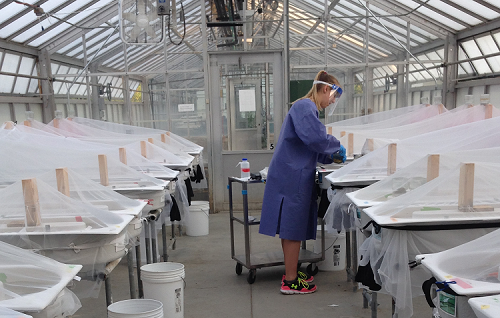
Alexis Paspalof, graduate student, will defend her master's degree thesis at noon, April 13 in Hardin Hall, Room 901.
Paspalof's thesis is titled, "The Occurrence and Ecological Effects of Amphetamine Type Stimulants on Aquatic Organisms." Her advisers are Daniel Snow and Emma Rosi-Marshall.
Abstract:
The occurrence of pharmaceuticals, illicit drugs and their bioactive metabolites in aquatic environments has become an increasingly important topic worldwide. While it is increasingly evident that these compounds occur in surface and ground water impacted by wastewater, the potential ecological effects from their exposure to aquatic organisms are virtually unknown. The focus of this study is to better understand both the occurrence and potential effects of amphetamine type stimulants (ATSs) in wastewater-impacted environments. First, samples were collected and analyzed for pharmaceuticals, including ATSs, in two different watersheds downstream from the highly populated Hudson River, in New York and Gwynn Falls in Baltimore, Maryland. These two watersheds were chosen because each had stations that were part of existing long-term ecological studies. Although much was known about the ecology of these highly urbanized watersheds, little data is available indicating contamination from pharmaceuticals and ATSs. While not highly prevalent, amphetamine (AMPH) was detected at one site in the Hudson River and consistently detected at low concentrations in all Gwynn Fall sites. The occurrence of all pharmaceuticals was related to other indicators showing the presence of wastewater effluent.
In addition to the field sampling, the potential effect of ATS exposure to aquatic ecosystem function was measured using exposed microbial biofilms to environmentally relevant concentrations of amphetamine. After 3 weeks, dissolved amphetamine exposure in stream mesocosms suppressed gross primary production and community respiration, despite a significant decrease in the parent compound concentration. Based on field and laboratory work, chronic exposure to environmentally relevant concentrations of ATSs and other pharmaceuticals may affect ecosystem functions and the organisms that depend on these functions. Finally, because catecholamine production is known to be affected by stimulant exposure in higher organisms, an experiment was conducted to evaluate aquatic organism exposure to dopamine (DA). Current literature indicates the presence of DA in marine algae, and its production is thought to help control predation. This study reports the biological effects DA has on freshwater algae at concentrations similar to environmental concentrations in marine environments.